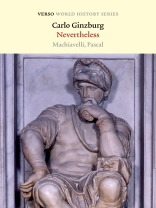Nevertheless comprises essays on Machiavelli and on Pascal. The ambivalent connection between the two parts is embodied by the comma (, ) in the subtitle: Machiavelli, Pascal. Is this comma a conjunction or a disjunction?
In fact, both. Ginzburg approaches Machiavelli’s work from the perspective of casuistry, or case-based ethical reasoning. For as Machiavelli indicated through his repeated use of the adverb
nondimanco (‘nevertheless’), there is an exception to every rule. Such a perspective may seem to echo the traditional image of Machiavelli as a cynical, ‘machiavellian’ thinker. But a close analysis of Machiavelli the reader, as well as of the ways in which some of Machiavelli’s most perceptive readers read his work, throws a different light on Machiavelli the writer. The same hermeneutic strategy inspires the essays on the
Provinciales, Pascal’s ferocious attack against Jesuitical casuistry.
Casuistry vs anti-casuistry; Machiavelli’s secular attitude towards religion vs Pascal’s deep religiosity. We are confronted, apparently, with two completely different worlds. But Pascal read Machiavelli, and reflected deeply upon his work. A belated, contemporary echo of this reading can unveil the complex relationship between Machiavelli and Pascal – their divergences as well as their unexpected convergences.
लेखक के बारे में
Carlo Ginzburg was born in Turin and now teaches at UCLA. He is the author of The Cheese and the Worms: The Cosmos of the Sixteenth-Century Miller, Ecstasies: Deciphering the Witches’ Sabbath and The Night Battles: Witchcraft and Agrarian Cults in the Sixteenth and Seventeenth Centuries.












